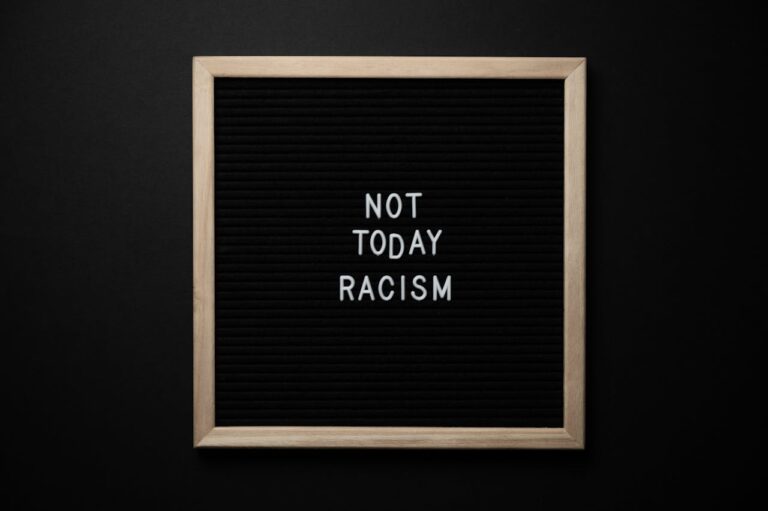The term “racism” carries a weighty meaning, describing one of the most insidious forms of discrimination and hate. It evokes images of segregated facilities, cross burnings, hate crimes, and institutionalized oppression designed to marginalize entire groups based on skin color or ethnicity.
However, in recent years, there has been a troubling trend of overusing and misapplying this powerful term to situations where it doesn’t accurately apply. From political pundits to workplace disagreements to social media dustups, the word has become a default accusation. This promiscuous use of “racism” has the potential to damage society in profound ways.

The Consequences of Overuse
When everything from opposing political views to disagreements over workplace policies gets dubbed as “racist,” it begins to water down the severity and dilute the meaning of true racism.
Genuine racism involves discriminating against, devaluing, or oppressing someone due to their race or ethnicity, often based on abhorrent beliefs of racial superiority or hatred. It creates systemic injustice and a toxic environment that damages lives, fractures communities, and holds back entire societies.
However, when the accusation of racism gets lobbed at every perceived slight or differing viewpoint, it cheapens and devalues the experiences of those who have actually endured real racism and its traumatic effects.
The Trauma of True Racism
Consider the Black families that lived through the Jim Crow era of legalized discrimination and violent intimidation in the American South. Their grandparents may have memories of being denied entry to restaurants, sitting in segregated theaters, or living under the domestic terrorism of the Ku Klux Klan’s night rides.
Or the Japanese-American citizens forced into internment camps during World War II due to racist hysteria and discrimination, their lives and livelihoods ripped apart.

Indigenous populations across continents have suffered centuries of oppression, genocide, dehumanization and segregation – injustices that still have deep reverberating effects on their communities today.
When the gravely serious matter of racism is assigned to something as trifling as a bookstore clerk’s bad attitude, it minimizes these powerful lived experiences as if they were no more impactful than a disagreement over office break room etiquette.
The Boy Who Cried Wolf
It’s essentially the “boy who cried wolf” principle. The more the term gets misused and cavalierly assigned, the less seriously it will be taken when it counts. People will become numb to the slew of unwarranted “racist” accusations and tune them out – which gives actual perpetrators of racism more discursive cover to perpetuate injustice.
Nuance and Critical Thinking Gets Lost
Part of what’s driving this over-labeling of “racism” stems from a lack of nuance and restraint in public discourse, fueled by escalating tribalism and losing the ability to understand differing perspectives.
In our polarized era, any perceived slight or disagreement – no matter how minor or subjective – gets classified through an “us vs them” lens, with the opposing party swiftly categorized as irredeemable. There is a reactionary impulse to be the first to denounce, the quickest to don the unimpeachable mantle of the virtuous.
This knee-jerk scorched earth reaction reflects a lack of empathy, restraint, and unwillingness to explore nuances or humanize those with opposing views. It’s easier to shut down dialogue than grapple with complexity.
But this approach is deeply counterproductive. It further divides society into mistrustful tribes, where any attempt to find common ground gets thwarted by an avalanche of inflammatory accusations and character assassinations.
A Path Forward
To preserve the gravitas of “racism” as a descriptor for genuinely racist behavior, more accountability, nuance, and restraint is needed from public figures, media institutions, and society at large in how, when, and why the term gets deployed.
Real incidents of racism need to be properly differentiated from perceived insensitive comments, microaggressions, cultural conflicts, and instances of people simply voicing differing political or philosophical viewpoints.
Thicker skin and disciplined critical thinking is required before lobbing such an inflammatory label. There needs to be space to have fraught conversations about race, identity, and cultural alienation, without immediately escalating to calling someone or something “racist” at the first sign of disagreement or perceived offense.

After all, not every racist act is committed with malicious intent or because of deep-seated hatred. Often discrimination stems from ignorance, unconscious biases absorbed from one’s environment, or insensitivities born of lack of exposure. These factors don’t excuse racist behavior, but illustrate how nuanced and deeply systemic these issues often are. Dialogue and education become crucial.
Crying wolf by over-accusing “racism” without proper discernment makes it more difficult to identify real cases, address root causes, and work towards actual systemic solutions to achieve racial equity.
Preserving the Weight of 'Racism'
Make no mistake, racism is still a pervasive, systemic issue in society. Overt acts like hate crimes and blatant discrimination have simply blended with more insidious forms of injustice related to housing, education, lending practices, hiring, unconscious biases, representation in media, the justice system, and other spheres impacting quality of life.
When the word “racism” gets cheapened and rendered ineffective from overuse, it gives those who perpetrate racist policies and behaviors more cover to operate freely. Bad actors can easily deflect the accusation as just another bad faith over-reaction.
That’s why society needs to be more disciplined about delineating what is merely a breach of decorum or opposing viewpoint, versus what constitutes genuine discriminatory racist incidents deserving of serious sanction.
Otherwise, society will remain trapped in tribal grievance competitions where progress gets eternally stalled by accusations flying in every direction. And the word “racism” will continue its path toward becoming a hollow, increasingly meaningless utterance – missing the opportunity to identify and remedy the injustices that still require society’s urgent attention.
Hey there! We hope you love our fitness programs and the products we recommend. Just so you know, Symku Blog is reader-supported. When you buy through links on our site, we may earn an affiliate commission at no extra cost to you. It helps us keep the lights on. Thanks.
Disclaimer: The information provided in this discussion is for general informational and educational purposes only. It is not intended as medical or professional advice. Only a qualified health professional can determine what practices are suitable for your individual needs and abilities.

